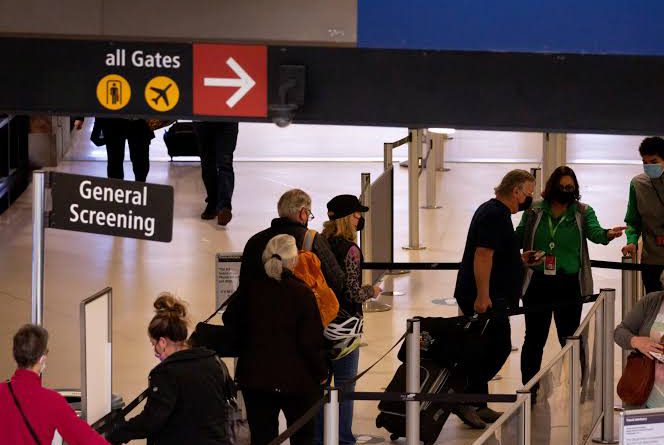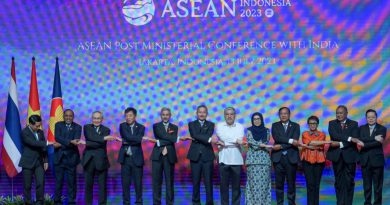U.S. to lift curbs from Nov. 8 for vaccinated foreign travelers – White House
Washington (Reuters) – The White House on Friday said it will lift COVID-19 travel restrictions for fully vaccinated foreign nationals effective Nov. 8, ending historic restrictions that had barred much of the world from entering the United States.
Announcing the starting date for the new rules on travel into and out of the country, White House spokesman Kevin Munoz posted on Twitter that the policy “is guided by public health, stringent, and consistent.”
The unprecedented travel restrictions kept millions of visitors out of the United States from China, Canada, Mexico, India, Brazil, much of Europe and elsewhere; shrunk U.S. tourism; and hurt border community economies. They prevented many loved ones and foreign workers from reuniting with families.
U.S. allies had heavily lobbied the Biden administration to lift the rules.
Restrictions on non-U.S. citizens were first imposed on air travelers from China in January 2020 by then-President Donald Trump and then extended to dozens of other countries, without any clear metrics for how and when to lift them.
Curbs on non-essential travelers at land borders with Mexico and Canada have been in place since March 2020 to address the COVID-19 pandemic.
Reuters first reported Friday’s announcement of the Nov. 8 starting date earlier in the day.
U.S. airline, hotel and cruise industry stocks rose on the news, including American Airlines (AAL.O), up 2%; Marriott International Inc (MAR.O), up 3.7%; and Carnival Corp (CCL.N), up 1.6%.
U.S. international air passenger traffic was down 43% in August and overall passenger air traffic was down 21% over pre-pandemic levels, the U.S. Transportation Department said Friday.
Airlines have seen an increase in international ticket sales in recent weeks, Nick Calio, chief executive of the Airlines for America industry trade group, said in a statement. Calio said the “full reopening of international travel is also critical to reviving economies around the globe, reinvigorating communities and supporting millions of jobs in the U.S. and abroad.”
The United States had lagged many other countries in lifting such restrictions.
The White House on Tuesday announced it would lift restrictions at its land borders and ferry crossings with Canada and Mexico for fully vaccinated foreign nationals in early November. They are similar but not identical to requirements announced last month for international air travelers.
Unvaccinated visitors will still be barred from entering the United States from Canada or Mexico at land borders.
Canada on Aug. 9 began allowing fully vaccinated U.S. visitors for non-essential travel.
The Centers for Disease Control and Prevention (CDC) told Reuters last week the United States will accept the use by international visitors of COVID-19 vaccines authorized by U.S. regulators or the World Health Organization.
The White House, which held a meeting late Thursday to finalize the Nov. 8 date, faces some remaining questions, including how and what exemptions the Biden administration will grant to the vaccine requirements. Children under 18, for example, are largely expected to be exempt from the requirements, an official said.
U.S. Travel Association Chief Executive Roger Dow said declines in international visits since the pandemic started resulted in more than $250 billion in lost income.
Dow said in a statement that the Nov. 8 date “is critically important for planning – for airlines, for travel-supported businesses, and for millions of travelers worldwide who will now advance plans to visit the United States once again.”
The White House announced on Sept. 20 that the United States would lift restrictions on air travelers from 33 countries in early November. It did not specify the date at the time.
Starting Nov. 8, the United States will admit fully vaccinated foreign air travelers from the 26 so-called Schengen countries in Europe, including France, Germany, Italy, Spain, Switzerland and Greece, as well as Britain, Ireland, China, India, South Africa, Iran and Brazil. The unprecedented U.S. restrictions have barred non-U.S. citizens who were in those countries within the past 14 days.
The United States has allowed foreign air travelers from more than 150 countries throughout the pandemic, a policy that critics said made little sense because some countries with high infection rates were not on the restricted list, while some on the list had the pandemic more under control.
The White House said last month it would apply vaccine requirements to foreign nationals traveling from all other countries.
Non-U.S. air travelers will need to show proof of vaccination before boarding a flight, and will need to show proof of a recent negative COVID-19 test. Foreign visitors crossing a land border will not need to show proof of a recent negative COVID-19 test.
The new rules do not require foreign visitors or Americans entering the country to go into quarantine.
Americans traveling overseas must still show proof of a recent negative COVID-19 test, and unvaccinated Americans will face stricter testing requirements. They will also be subject to restrictions in countries they plan to visit, which may include quarantines.
The CDC plans to issue new rules soon on contact tracing for international air travelers.



